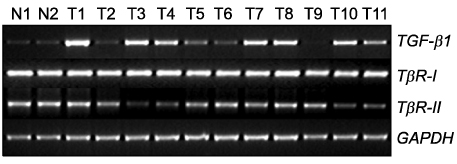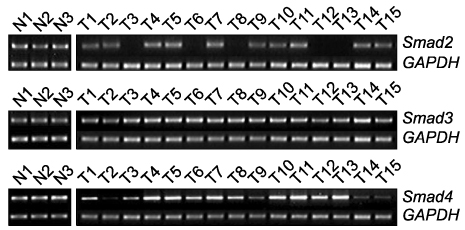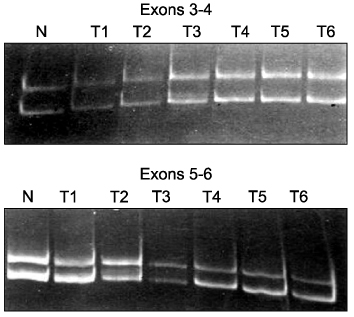J Gynecol Oncol.
2009 Jun;20(2):117-121. 10.3802/jgo.2009.20.2.117.
Expression and mutational analysis of TGF-beta/Smads signaling in human cervical cancers
- Affiliations
-
- 1Department of Obstetrics and Gynecology, East-West Neo Medical Center, Kyung Hee University, Seoul, Korea. diners99@naver.com
- 2School of Life Sciences and Biotechnology, Korea University, Seoul, Korea.
- KMID: 2245095
- DOI: http://doi.org/10.3802/jgo.2009.20.2.117
Abstract
OBJECTIVE
To define the molecular basis of TGF-beta1 function in cervical carcinogenesis, we explored the expression and mutational status of TGF-beta1, TGF-beta1 receptors, and Smads, the regulators of the TGF-beta1 signaling pathway, in human cervical cancers.
METHODS
Expression of TGF-beta1, TGF-beta1 receptors, and Smads transcripts were determined by quantitative reverse transcription-polymerase chain reaction (RT-PCR), and sequence alteration was analyzed using RT-PCR-single-strand conformation polymorphism (SSCP) analysis. Genomic levels of TGF-beta1, TGF-beta1 receptors and Smads was also measured by quantitative genomic PCR.
RESULTS
Abnormal overexpression of TGF-beta1 and abnormal reduction of type II TGF-beta1 receptor were identified in 36% (18 of 50) and 20% (10 of 50) of cervical cancer tissues, respectively. 22% (11 of 50) in Smad2 and 14% (7 of 50) in Smad4 revealed tumor specific mRNA reduction less than a half of normal means. In addition, no evidence for sequence alterations of the gene was found by RT-PCR-SSCP analysis.
CONCLUSION
Our study demonstrates that disruption of TGF-beta/Smad signaling pathway exist in human cervical cancer, suggesting that abnormal expressions of the member of TGF-beta/Smad signaling pathway might contribute to the malignant progression of human cervical tumors via suppressing the tumor suppression function of TGF-beta1 1's tumor suppression function.
Keyword
MeSH Terms
Figure
Reference
-
1. Shin HR, Jung KW, Won YJ, Park JG. 139 KCCR-affiliated Hospitals. 2002 annual report of the Korea central cancer registry: based on registered data from 139 hospitals. Cancer Res Treat. 2004. 36:103–114.2. Waggoner SE. Cervical cancer. Lancet. 2003. 361:2217–2225.3. Kang SH, Won K, Chung HW, Jong HS, Song YS, Kim SJ, et al. Genetic integrity of transforming growth factor beta (TGF-beta) receptors in cervical carcinoma cell lines: loss of growth sensitivity but conserved transcriptional response to TGF-beta. Int J Cancer. 1998. 77:620–625.4. Kim JW, Kim HS, Kim IK, Kim MR, Cho EY, Kim HK, et al. Transforming growth factor-β1 induces apoptosis through down-regulation of c-mycGene and overexpression of p27Kip1 protein in cervical carcinoma. Gynecol Oncol. 1998. 69:230–236.5. Shi Y, Massagu J. Mechanisms of TGF-β signaling from cell membrane to the nucleus. Cell. 2003. 113:685–700.6. Massague J. TGF-beta signal transduction. Annu Rev Biochem. 1998. 67:753–791.7. Pasche B. Role of transforming growth factor beta in cancer. J Cell Physiol. 2001. 186:153–168.8. Liu X, Sun Y, Weinberg RA, Lodish HF. Ski/Sno and TGF-beta signaling. Cytokine Growth Factor Rev. 2001. 12:1–8.9. Massague J. How cells read TGF-beta signals. Nat Rev Mol Cell Biol. 2000. 1:169–178.10. Massague J, Chen YG. Controlling TGF-beta signaling. Genes Dev. 2000. 14:627–644.11. Lynch MA, Nakashima R, Song H, DeGroff VL, Wang D, Enomoto T, et al. Mutational analysis of the transforming growth factor beta receptor type II gene in human ovarian carcinoma. Cancer Res. 1998. 58:4227–4232.12. Kim SJ, Im YH, Markowitz SD, Bang YJ. Molecular mechanisms of inactivation of TGF-beta receptors during carcinogenesis. Cytokine Growth Factor Rev. 2000. 11:159–168.13. Chen T, Triplett J, Dehner B, Hurst B, Colligan B, Pemberton J, et al. Transforming growth factor-beta receptor type I gene is frequently mutated in ovarian carcinomas. Cancer Res. 2001. 61:4679–4682.14. Riggins GJ, Kinzler KW, Vogelstein B, Thiagalingam S. Frequency of Smad gene mutations in human cancers. Cancer Res. 1997. 57:2578–2580.15. Siegel PM, Massague J. Cytostatic and apoptotic actions of TGF-beta in homeostasis and cancer. Nat Rev Cancer. 2003. 3:807–821.16. Derynck R, Akhurst RJ, Balmain A. TGF-beta signaling in tumor suppression and cancer progression. Nat Genet. 2001. 29:117–129.17. Kang SH, Bang YJ, Im YH, Yang HK, Lee DA, Lee HY, et al. Transcriptional repression of the transforming growth factor-beta type I receptor gene by DNA methylation results in the development of TGF-beta resistance in human gastric cancer. Oncogene. 1999. 18:7280–7286.18. Markowitz SD, Roberts AB. Tumor suppressor activity of the TGF-beta pathway in human cancers. Cytokine Growth Factor Rev. 1996. 7:93–102.19. Hazelbag S, Kenter GG, Gorter A, Dreef EJ, Koopman LA, Violette SM, et al. Overexpression of the alpha v beta 6 integrin in cervical squamous cell carcinoma is a prognostic factor for decreased survival. J Pathol. 2007. 212:316–324.20. Welch DR, Fabra A, Nakajima M. Transforming growth factor beta stimulates mammary adenocarcinoma cell invasion and metastatic potential. Proc Natl Acad Sci USA. 1990. 87:7678–7682.
- Full Text Links
- Actions
-
Cited
- CITED
-
- Close
- Share
- Similar articles
-
- Expression Pattern of Smad Proteins in Diffuse Large B-cell Lymphomas
- Altered Expression of Smad Proteins in T or NK-cell Lymphomas
- Role of TGF-beta signaling and Ski/SnoN mRNA expression in cervical carcinomas
- Contrasting Roles of Different Endoglin Forms in Atherosclerosis
- Expression of Transforming Growth Factor-alpha and Transforming Growth Factor-beta In Human Primary Lung Cancers





